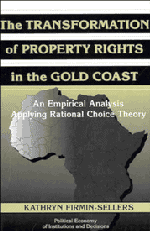 The Transformation of Property Rights in the Gold Coast
The Transformation of Property Rights in the Gold Coast Book contents
Preface
Published online by Cambridge University Press: 08 January 2010
Summary
This book explores the transformation and enforcement of property rights to land in two traditional states in colonial Ghana. In so doing, it engages themes of concern to diverse audiences. Most obviously, the book is relevant to students of African politics. The case studies contained herein ask how colonial institutions transformed indigenous political and economic life; and how colonization and decolonization affected prospects for future economic development and political stability in Africa.
The case studies in this book are equally relevant to property rights theorists and rational choice institutionalists. Theories of the emergence and maintenance of property rights institutions are “the least developed area of Neoinstitutional Economics. ” Scholars recognize the importance of secure property rights, but they cannot explain how conflict over the distribution of property rights affects the demand for and supply of secure rights. Neither have they identified the conditions under which rulers will choose to enforce property rights, and the conditions under which such enforcement is credible. The latter omission is crucial: Property rights serve as a foundation for economic growth only when citizens perceive those rights to be secure.
The introduction to this book addresses these questions, outlining a theory of the transformation and enforcement of property rights. The remaining, empirical chapters illustrate and refine these theoretical insights within an African context.
Finally, the case studies in this book are of concern to critics of rational choice theory. Critics charge that most rational choice scholars do not engage in rigorous empirical work.
- Type
- Chapter
- Information
- The Transformation of Property Rights in the Gold CoastAn Empirical Study Applying Rational Choice Theory, pp. ix - xPublisher: Cambridge University PressPrint publication year: 1996
